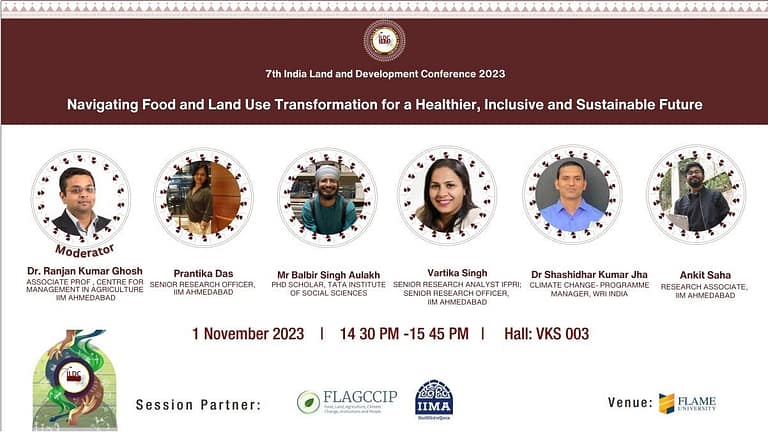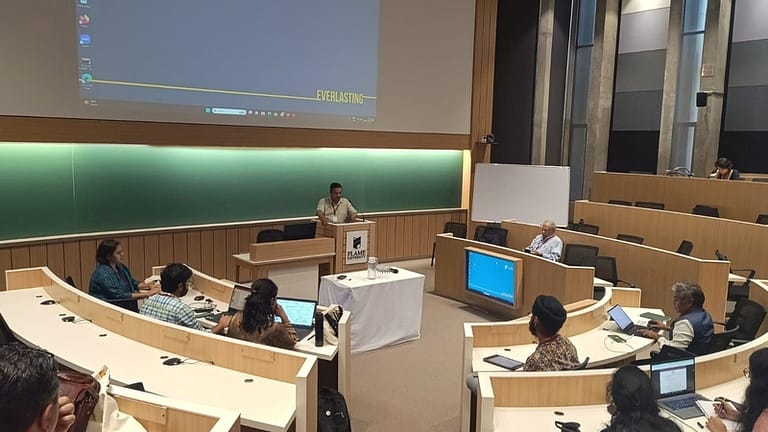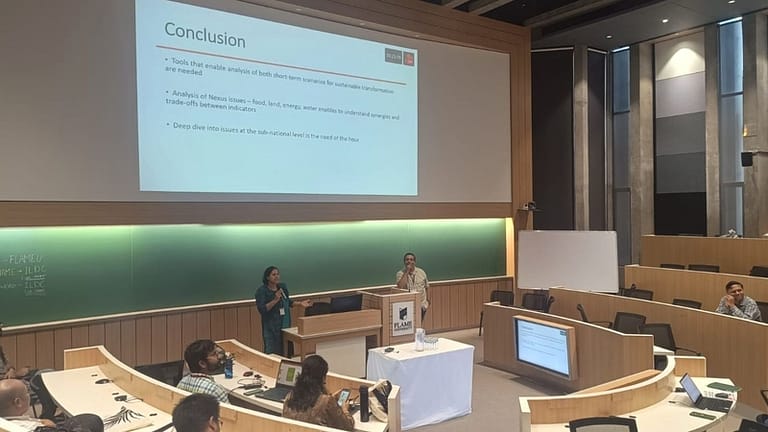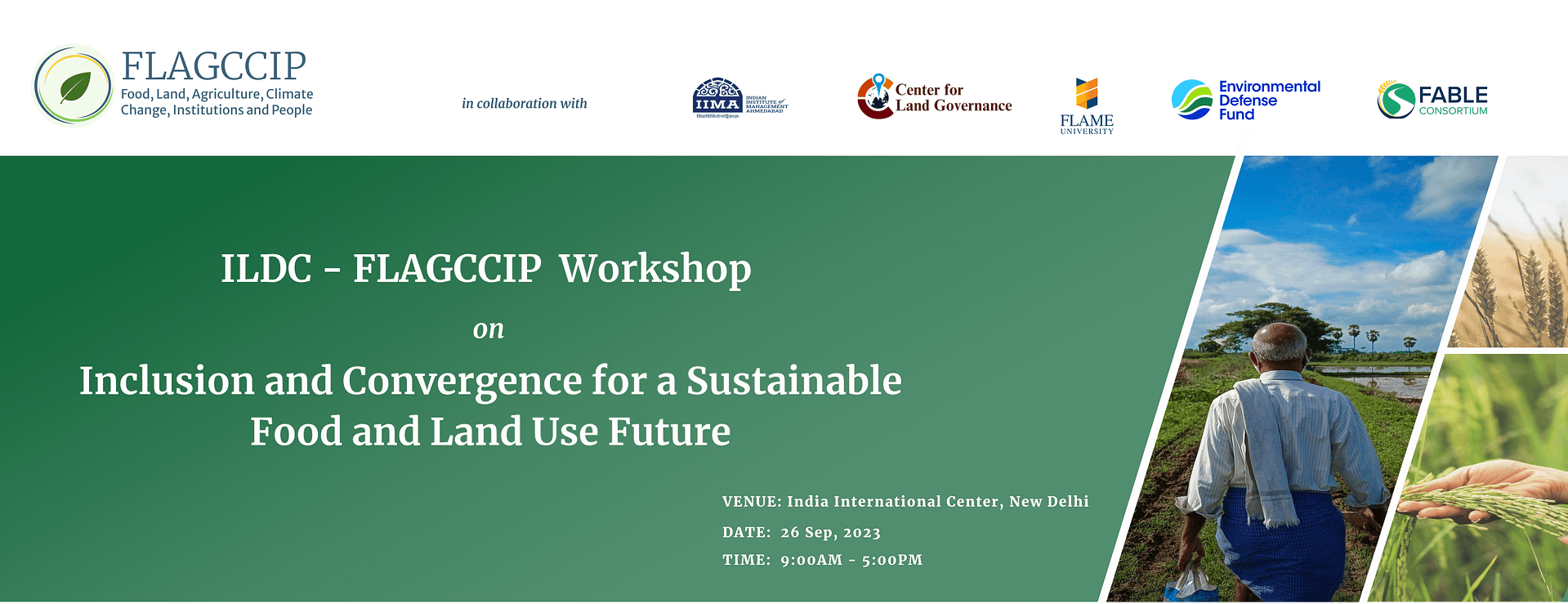Contact Us
Email: flagccipforum2023@gmail.com





FLAGCCIP Forum hosted a session titled “Navigating Food and Land-use Transformations for Healthier, Inclusive, and Sustainable Futures” at the 7th India Land and Development Conference, 2023, FLAME University, Pune; moderated by Ranjan Ghosh from Indian Institute of Management Ahmedabad.
The session focused on the nexus approach of food land water energy and presented evidence and tools of potential policy measures to bring sustainable transformation in India. The interactions between science and policy were highlighted, where policies drive the assumptions and predictions help identifying key intervention points for transformative food and land-use systems. Presenters discussed results on pathways based on the FABLE calculator and the MAgPIE model. The session concluded with focus on the importance of local governance and localized approach while tackling issues related to food and land-use systems.





FLAGCCIP hosted a round table discussion session on Balancing Competing Land Interests through Theories and Evidence Based Practices on the second day of 7th India Land and Development Conference 2023; facilitated by Prof. Ranjan Ghosh (Indian Institute of Management Ahmedabad), Pranab Choudhury (Centre for Land Governance), and Prof. Yugank Goyal (FLAME University). The session brought together numerous experts, practitioners, and budding researchers looking at impact of changing dynamics of commons from a food and land-use system perspective.
The session highlighted issues related to land governance, tenure, and rights and their changing dynamics in peri-urban and coastal ecosystems specifically. The lack of participatory development initiatives and inclusive institutions, along with climate change, are escalating the vulnerabilities of the commons through migration, loss of livelihood, and environmental degradation. The session concluded with the approach to facilitate and initiate further collaborations among the participants to fill the gaps in literature and work together with policymakers and local communities to protect, conserve, and restore the ecosystem.

The ILDC-FLAGCCIP Workshop on “Inclusion and Convergence for a Sustainable Food and Land Use Future” was organized at the India International Centre, New Delhi on 26th September 2023. The workshop was in collaboration with Indian Institute of Management Ahmedabad, Center for Land Governance, FLAME University, Environmental Defense Fund and FABLE Consortium of Sustainable Development Solutions Network.
The workshop began with a commencement speech by Ranjan Ghosh (IIMA) and Pranab Choudhury (CLG) (co-conveners of FLAGCCIP) which was followed by an inspiring inaugural session by eminent experts and policy makers such as Vijay Paul Sharma (Chairperson, Commission for Agricultural Costs and Prices, Government of India), Gauri Kumar (IAS Retd. and Wheels Water Foundation), Anil Gupta (Padma Shri, founder GIAN and SRISTI), Soumya Swaminathan (ex-Chief Scientist, WHO and Chairperson, MSSRF), Mika-Petteri Törhönen (Lead Land Administrator, The World Bank), Mariano Beheran (Minister Agricultural Attache, Argentina), and Hisham Mundol (Environmental Defense Fund). The speakers shared their insights on the challenges and levers in the sustainability of food and land-use systems with major focus on soil health, better inputs, livestock health and productivity, nutritional security, land tenure security, village level planning, SDGs, and climate action. Special emphasis was laid on understanding the importance of collaborative governance, scientific evidence-based policy making, community engagement, land-use profiling, and knowledge transparency that can serve as potential avenues for sustainable agricultural and food system futures.
It was then followed by discussions on regenerative and inclusive agricultural production systems, and food system transformations for mitigation and adaptation, which were facilitated by Yugank Goyal and Vartika Singh respectively. Nearly 40 experts and representatives from many key stakeholder organizations actively participated including Ministry of Agriculture and Farmers’ Welfare, Ministry of Panchayati Raj, Ministry of Environment and Forests, ICAR- Indian Council of Agricultural Research, International Food Policy Research Institute (IFPRI) – CGIAR, German Agency for International Cooperation (GIZ), Public Health Foundation of India (PHFI), Forest Research Institute (ICFRE), Foundation For Ecological Security (FES), WASSAN, ICRAF, Caritas Austria, WRI India, Mahindra Sustainability Initiatives and Syngenta Foundation for Sustainable Agriculture.
Anil Gupta (Padma Shri), Shekhar Shah (ex- DG, NCAER) and Satish Deodhar (Dean, IIMA) summarized these sessions and gave insights on major focal points which need intervention with special attention to how collaborative governance is not a choice anymore, but a necessity. The workshop concluded on directions as to how convergence can be created between state agencies, science, markets, and communities to pave way for an informed decision making and grassroots transformations to restore and sustain a stressed food and land use system.










The global food system, in its endeavor to feed the enormous population, exerts a significant ecological impact on our planet. The decisions made in this context entail substantial lock-in risks pertaining to infrastructure, land tenure and use. These issues originate from a decentralized and complex pattern of food production, which involves several producers operating within diverse land use systems. It happens in a village mosaic governed under a tenure continuum influenced by local biophysical, socioeconomic, historical and cultural factors. Thus the significance of local stakeholders in developing sustainable solutions in alignment with national interests and sovereignty cannot be undermined. Recent studies have shown that dietary shifts, crop and livestock intensification, water use efficiency, lower fertilizer use and technological change can reduce emissions from farming, increase farmer profitability and make the agrifood systems more sustainable – thereby, creating a win-win situation. However, these invariably depend upon how policy, institutions and property rights systems shape up to promote inclusion and convergence at all stages of the transformation.
With an aim to assist the sustainable transitions of the agrifood system in India and the global south the Food, Land, Agriculture, Climate Change, Institutions and People (FLAGCCIP) Forum seeks to establish meaningful and purposeful discourses between policymakers, researchers, entrepreneurs, action groups, civil society, and farmers. Working in close collaboration with the global Food, Agriculture, Biodiversity, Land-Use, and Energy (FABLE) consortium and partners such as Environmental Defense Fund (EDF), FLAGCCIP’s objective is to employ integrated modelling and data synchronization as a science-based strategy to create country-specific pathways that are informed by and adaptive of local cultures and contexts. The Centre for Land Governance (CLG) thrives to enrich India’s land governance ecosystem with actors, information and innovations to trigger inclusive land tenure security and sustainable development. It engages with inter-disciplinary issues around land tenure, focusing on informalities in rural, forested and urban landscapes and assessing institutional, technology and data options, with policy, practice and research actors, locally and globally. To discuss the challenges – and collate actionable solutions – on diverse aspects for attaining a sustainable food and land use alliance and future for India and the global south, the FLAGCCIP team and CLG have joined hands to host the 3rd event of the India Land and Development Conference (ILDC) Workshop Series on ‘Inclusion and Convergence for a Sustainable Food and Land Use Future’. The aim is to identify the inclusion challenges, gaps in policy convergence and need for capacity building in attaining sustainable food and land use transitions as well as convergence and collaborative opportunities.
ILDC over the last six years, has built a unique convergent platform for inclusive, inter-disciplinary and inter-sectoral conversation among land actors – global and local. It has been impactful in expanding land ecosystem, in terms of knowledge exchange, actor involvements, partnership building, informed engagements and sectoral enrichments. Yet, gaps remain, around in-depth and nuanced engagements on specific or inter-disciplinary topics of contemporary importance (to
India and global south) and in terms of potential solutions or way forward. The 1st ILDC workshop was organized at FLAME University, Pune during 27-28 March 2023 on the topic ‘Land Administration Innovation through Technology and Structural Reform – Policy and Practice Implications and Impact.’ The 2nd Workshop was on ‘Land Tenure and Climate Change Action: Connections & Implications’ at Azim Premji University, Bengaluru on 8th July 2023. This current workshop is the 3rd in this series towards sustained dialogues for bridging the gaps in achieving sustainable and equitable food and land systems
Email: flagccipforum2023@gmail.com
